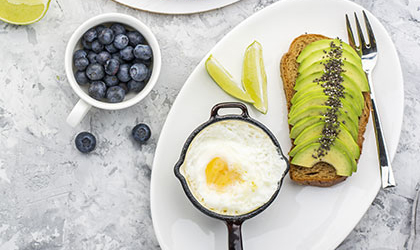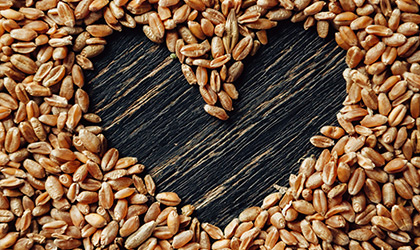
High blood pressure is no laughing matter. Otherwise known as the ‘silent killer’, this symptomless condition is a major risk factor for stroke and heart disease. A worrying 16 million people in the UK suffer from high blood pressure, yet 63% are unaware of their blood pressure numbersi. Let’s get scientific briefly: your blood pressure is assessed in millimetres of mercury, abbreviated as ‘mm Hg’. Your systolic blood pressure is the top number on your reading, denoting the pressure in your blood vessels when your heart beats. Your diastolic blood pressure, on the other hand, is the bottom number on the reading, representing the pressure in your blood vessels between beats. Thankfully, you can remedy elevated blood pressure with diet and lifestyle improvements.
Fine-tune your diet
Optimising your nutrition launches a two-pronged attack against high blood pressure; it supports weight loss and lowers your blood pressure. A review published in 2016 found that weight loss reduced blood pressure by an average of 4.5 mm Hg systolic and 3.2mm Hg diastolic, so it’s definitely worth prioritisingii. Even losing 5 to 10 pounds can help! Here’s where to focus your efforts.
Ditch processed foods
Sure – pizza, fries and deli meats may fulfil a short-lived craving, but in excess, they will have a lasting impact on your blood pressure. Cutting down – or, better still, ditching processed foods entirely – means you’ll eat fewer refined carbs, less sugar, and less salt – all of which can result in lower blood pressure. Make a conscious effort to check food labels, too. Becoming an ingredient sleuth will help you avoid the processed junk hiding in many food products. Watch out for trans fats, and high sugar and sodium contents. Remember, adults shouldn’t eat more than 6g of salt a day – that’s the equivalent of 1 teaspoon.
Pack in the potassium
Thanks to it counteracting the negative effect of salt in the body, potassium is a powerhouse for elevated blood pressure. Embracing a range of potassium-rich foods – fruits (bananas, avocados, apricots, and oranges), veggies (potatoes, sweet potatoes, tomatoes, and leafy greens), fish, legumes, and coconut water – will help maintain the delicate salt status quo in your blood stream. That said, it is possible to have too much of a good thing. If you have kidney disease, diets rich in potassium can be harmful. Be sure to consult your doctor before upping your potassium intake.
DASH (Dietary Approaches to Stop Hypertension)
The pithier acronym for ‘Dietary Approaches to Stop Hypertension’, DASH is the regimen designed to lower blood pressure. DASH stresses the importance of eating an abundance of fruit, veggies, low-sodium foods, low-fat dairy, whole grains, nuts, poultry, fish, beans, and fewer red meats and sweets. In a randomised controlled trial of 459 healthy individuals with slightly elevated blood pressure, those who followed a DASH diet exhibited lower blood pressure and total cholesterol at the end of the eight-week trial periodiii. If you’re a fast food junkie, this may take more willpower, but trust us when we say it’s a godsend for your blood pressure.
Get moving
Though nutritionists and experts’ conflict on certain health issues, they all agree unanimously on one thing: the importance of exercise. And when it comes to managing high blood pressure, physical activity is at the fore. Regular workout sessions will cultivate a stronger heart that pumps blood with less effort, resulting in reduced pressure on your arteries, and yes – lower blood pressure. You don’t have to run ultra-marathons to zap high blood pressure, though; doing household chores, gardening, playing team sports, using the stairs, or walking to work all count, too. Just try to move your body moderately for at least 30 minutes per day.
Stub out smoking
As far as vices go, smoking is up there with the worst. And it’s a public enemy numero uno for blood pressure. Over time, the chemicals in tobacco smoke increase blood pressure by harming your blood vessel walls, sparking inflammation and restricting your arteries. Second-hand smoke can even impact blood pressure. One study demonstrated that children exposed to second-hand smoke experienced higher blood pressure than those from non-smoking householdsiv. Just another reason to stub out this habit for good, don’t you think?
Prioritise sleep
How many of you clocked a restorative eight hours of sleep last night? If so, your energy levels won’t be the only thing reaping the benefits – your blood pressure will be in a happy place, too. But if you’re bleary-eyed from broken slumber, your blood pressure will also take a hit. You see, regularly sleeping less than five hours a night has been directly associated with significantly higher blood pressure in the long termv. While insomnia can’t be cured overnight, there are measures you can take to improve your sleep hygiene. Cutting back on caffeine after noon, initiating a digital curfew two hours before bed, creating a dark, quiet, and temperate sleep sanctuary, and establishing a healthy bedroom ritual are techniques that are known to send you into dreamland. Discover more ways to drift off naturally here.
Slash stress
Let’s be real for a second: life can be stressful. Whether it’s family commitments, global politics, personal insecurities, or financial woes, we’re all familiar with the merciless wrath of stress. Despite its commonplace in modern life, this crippling emotion can send blood pressure soaring. Finding ways to alleviate tension is the key to supporting your overall health. There’s no one-size-fits-all approach for tackling stress – you have to find what works for you. Walking in nature, yoga, meditation, escaping into a fictional world, or practising deep breathing can provide immense relief. One report even suggested listening to music daily could reduce systolic blood pressurevi. Next time you feel your anxiety levels rising, draw on your personal stash of stress-busting tools. Your emotional health and blood pressure will thank you for it. Find out more about overcoming stress here.
Take it easy on the tipples
You may be fit and healthy otherwise, but that post-work tipple will still raise your blood pressure. In fact, alcohol can increase your blood pressure by 1mm Hg for every 10 grams of booze consumed (side note: a standard beverage – that is, 5 ounces of wine or 12 ounces of beer – packs 14 grams of alcohol). Drinking in moderation is the secret to keeping a handle on your blood pressure. Generally, women should drink no more than one drink per day, while men should stick to no more than two. Why not swap your mid-week G&T for a delicious mocktail?
Dig into dark chocolate
Chocolate lovers, rejoice – you can now indulge in dark chocolate in the name of reducing blood pressure. But we’re not talking about nose-diving into the cheap, sugary stuff; your bar of dark chocolate needs to deliver at least 60 to 70 per cent of cacao to work its magic. In a 2010 study of 14,301 healthy participants, experts discovered those who ate more dark chocolate exhibited lower blood pressure than their non-chocolate-eating counterpartsvii. The blood pressure-busting benefits are thought to stem from the flavonoids in dark chocolate – antioxidants that help to dilate your blood vessels. Craving a sugary je ne sais quoi? Ditch the doughnuts and ice cream; go for two squares of heart-healthy dark chocolate instead.
References:
-
Ageuk.org.uk. (2019). 16 million people in the UK have high blood pressure Age UK. Available online: https://www.ageuk.org.uk/latest-news/archive/16-million-people-in-the-uk-have-high-blood-pressure [Accessed 22 Jan. 2019].
-
Semlitsch, T., Jeitler, K., Berghold, A., Horvath, K., Posch, N., Poggenburg, S. & Siebenhofer, A. (2016). Long-term effects of weight-reducing diets in people with hypertension. Cochrane Database of Systematic Reviews.
-
www.nhs.uk. (2019). Balanced diet cuts heart risk. Available online: https://www.nhs.uk/news/food-and-diet/balanced-diet-cuts-heart-risk [Accessed 22 Jan. 2019].
-
Seyedzadeh, A., Hashemi, F. & Soleimani, A. (2012). Relationship between Blood Pressure and Passive Smoking in Elementary School Children. Iranian journal of pediatrics, 22(3), 351-6.
-
Kawada, T. (2013). Poor Sleep With Normal Sleep Duration: A Preventive Effect on Incident Hypertension. Hypertension, 61(2).
-
Kühlmann, A., Etnel, J., Roos-Hesselink, J., Jeekel, J., Bogers, A. & Takkenberg, J. (2016). Systematic review and meta-analysis of music interventions in hypertension treatment: a quest for answers. BMC Cardiovascular Disorders, 16(1).
-
Al-Safi, S.A., Ayoub, N.M., Al-Doghim, I., Aboul-Enein, F.H. (2011). Dark Chocolate and Blood Pressure: A Novel Study from Jordan. Current Drug Delivery, 8(6), 595-599.
You Might Also Like

Olivia
Olivia Salter has always been an avid health nut. After graduating from the University of Bristol, she began working for a nutritional consultancy where she discovered her passion for all things wellness-related. There, she executed much of the company’s content marketing strategy and found her niche in health writing, publishing articles in Women’s Health, Mind Body Green, Thrive and Psychologies.
View More



